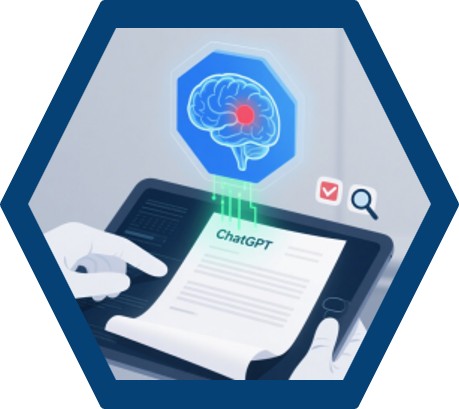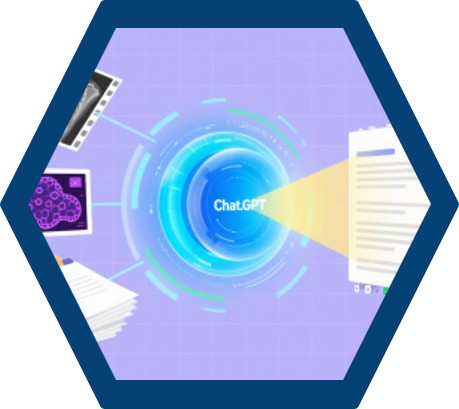If you are interested in products and services related to the research phase in this field, please contact for further inquiries.
The integration of artificial intelligence (AI) into healthcare has been a transformative force, and ChatGPT stands out as a pioneering development in this domain. Developed by OpenAI, ChatGPT leverages the Generative Pretrained Transformer (GPT) architecture to generate human-like text responses. This capability has far-reaching implications for healthcare, from patient education to clinical decision support. The potential to enhance patient outcomes, improve operational efficiency, and expand access to healthcare services makes ChatGPT a significant player in the evolving landscape of medical services.
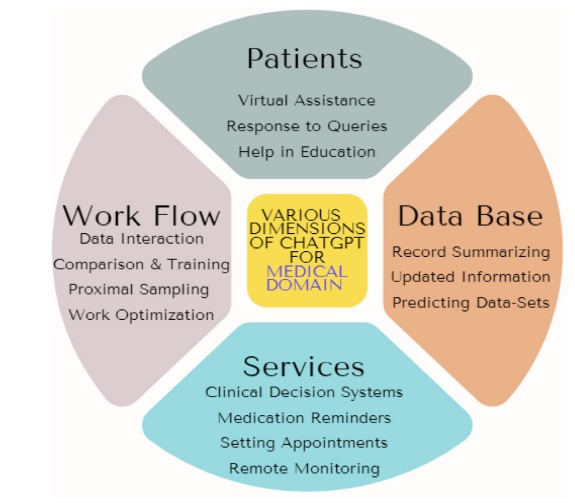 Fig.1 Associated dimensions of the ChatGPT framework for the medical domain. (Javaid M., et al., 2023)
Fig.1 Associated dimensions of the ChatGPT framework for the medical domain. (Javaid M., et al., 2023)
Patient Education and Empowerment
One of the most impactful applications of ChatGPT in healthcare is patient education. By providing accessible and accurate information, ChatGPT empowers patients to take a more active role in their healthcare journey. Patients can receive detailed explanations of their conditions, treatment options, and lifestyle modifications. For instance, a patient with diabetes can use ChatGPT to understand the importance of blood sugar monitoring and dietary adjustments. This not only enhances patient compliance but also fosters a more informed and engaged patient population.
- Symptom Checking and Initial Diagnosis
ChatGPT can act as a virtual assistant, helping patients identify symptoms and suggest possible diagnoses. This preliminary assessment can guide patients on whether to seek further medical attention. For example, a patient experiencing chest pain can input their symptoms into ChatGPT, which can then provide a list of possible conditions and recommend the next steps. This not only saves time but also ensures that patients receive timely advice.
- Personalized Health Information
ChatGPT can provide personalized health information based on a patient's medical history and current symptoms. For instance, a patient with a history of hypertension can receive tailored advice on managing their condition, including medication adherence and lifestyle changes. This personalized approach enhances patient engagement and improves health outcomes.
Clinical Decision Support Systems
ChatGPT's ability to analyze and interpret medical data positions it as a valuable tool for clinical decision support. Healthcare providers can leverage ChatGPT to review patient medical histories, vital signs, and other relevant data to make more informed treatment decisions. For example, ChatGPT can assist in recommending the appropriate dosage of medication based on a patient's medical profile. This not only improves patient safety but also enhances the overall quality of care.
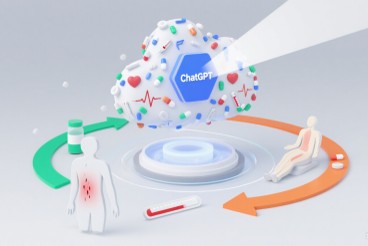
Treatment Recommendations
By analyzing patient data, ChatGPT can assist healthcare providers in making informed treatment decisions. It can review medical histories, vital signs, and other relevant information to recommend appropriate interventions. For instance, ChatGPT can suggest the best course of action for a patient with chronic pain, including medication recommendations and alternative therapies.
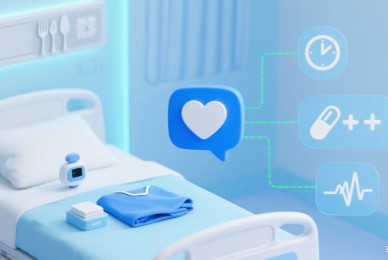
Pre- and Post-Operative Care
ChatGPT can provide personalized pre-operative instructions and post-operative pain management advice, ensuring patients receive tailored care based on their medical profiles. For example, a patient scheduled for surgery can receive detailed instructions on what to expect before and after the procedure, including pain management strategies and recovery tips.
Enhancing Medical Education
The field of medical education stands to benefit significantly from ChatGPT. Medical students and professionals can use this AI tool to access up-to-date information, simulate clinical scenarios, and receive immediate feedback. This interactive learning environment enhances the educational experience, making it more engaging and effective. ChatGPT can also assist in the creation of educational materials, ensuring that they are accurate and relevant to current medical practices.
- Interactive Learning
ChatGPT can enhance medical education by offering interactive learning experiences. Students can ask questions, receive immediate feedback, and explore complex medical concepts in a more engaging manner. For example, medical students can use ChatGPT to simulate clinical scenarios, practice diagnostic skills, and receive feedback on their performance.
- Educational Material Creation
ChatGPT can assist in the creation of educational materials, ensuring that they are accurate and relevant to current medical practices. For instance, ChatGPT can help develop case studies, quizzes, and other educational tools that can be used in medical training programs. This not only saves time but also ensures that educational materials are up-to-date and effective.
Streamlining Administrative Tasks
Administrative tasks in healthcare can be time-consuming and resource-intensive. ChatGPT can automate several of these tasks, such as report generation and appointment scheduling. By generating medical reports and summarizing clinical trials, ChatGPT can save healthcare providers valuable time, allowing them to focus more on patient care. Additionally, ChatGPT can assist in translating medical texts, facilitating communication between patients and healthcare providers who speak different languages.
Automated Report Generation
ChatGPT can automate the generation of medical reports, such as radiology reports, pathology reports, and discharge summaries. This not only saves time but also reduces the risk of errors. For example, a radiologist can use ChatGPT to generate a detailed report based on the imaging findings, ensuring that the report is accurate and comprehensive.
Appointment Scheduling
Patients can use ChatGPT to schedule appointments with healthcare providers, making the process more convenient and efficient. For instance, a patient can input their availability, and ChatGPT can suggest available appointment slots. This not only improves patient satisfaction but also enhances operational efficiency.
Addressing Limitations and Challenges
While ChatGPT offers numerous benefits, its integration into healthcare is not without challenges. Data privacy and security are paramount concerns, especially when handling sensitive patient information. Ensuring that patient data is protected from unauthorized access and misuse is crucial. Additionally, ChatGPT's responses must be accurate and reliable to avoid misdiagnoses or inappropriate treatment recommendations. Ethical considerations, such as the potential for job displacement and the need for informed consent, must also be addressed.
- Data Privacy and Security
The handling of sensitive patient information raises significant privacy concerns. Ensuring the confidentiality and security of patient data is paramount when using ChatGPT. For example, healthcare providers must ensure that patient data is encrypted and stored securely to prevent unauthorized access.
- Accuracy and Reliability
ChatGPT may generate incorrect or biased information, which could lead to misdiagnoses or inappropriate treatment recommendations. For instance, ChatGPT may struggle with the nuances and context of complex medical situations, leading to less accurate responses. Ensuring the accuracy and reliability of ChatGPT's responses is crucial for its successful integration into healthcare.
- Ethical Considerations
The use of AI in healthcare raises ethical questions about the role of technology in patient care, the potential for job displacement, and the need for informed consent. For example, healthcare providers must ensure that patients are informed about the use of AI in their care and provide consent. Additionally, the potential for job displacement due to the automation of certain tasks must be carefully managed to minimize negative impacts.
Future Developments and Innovations
The future of ChatGPT in healthcare is promising, with ongoing advancements in AI technology. OpenAI continues to improve the capabilities of GPT models, enhancing their speed, accuracy, and functionality. Future developments may include real-world data integration, expanded multilingual support, and more sophisticated clinical decision support algorithms. These advancements will further enhance the role of ChatGPT in healthcare, making it an indispensable tool for medical professionals and patients alike.
Real-World Data Integration
Integrating ChatGPT with real-world healthcare data will improve the accuracy and relevance of its responses. For example, ChatGPT can access electronic health records (EHRs) to provide more personalized and accurate recommendations. This integration will enhance the overall effectiveness of ChatGPT in healthcare.
Expanded Multilingual Support
Expanding the language capabilities of ChatGPT to support a wider range of languages and dialects will make healthcare services more accessible globally. For instance, ChatGPT can provide medical information in multiple languages, facilitating communication between patients and healthcare providers who speak different languages.
Advanced Clinical Decision Support
Developing more sophisticated algorithms to provide deeper insights and more accurate treatment recommendations will further enhance the role of ChatGPT in healthcare. For example, ChatGPT can analyze large datasets to identify patterns and trends, providing healthcare providers with valuable insights for clinical decision-making.
Conclusion
ChatGPT represents a significant advancement in AI technology with the potential to transform healthcare services. Its ability to generate human-like text and understand natural language makes it a valuable tool for patient education, clinical decision support, and administrative tasks. However, the successful integration of ChatGPT into healthcare requires careful consideration of data privacy, accuracy, and ethical implications. As technology continues to evolve, ChatGPT is poised to play a crucial role in shaping the future of healthcare, offering enhanced efficiency, accessibility, and patient outcomes.
By leveraging the power of AI, healthcare providers can deliver more personalized and effective care, while patients can benefit from improved access to information and support. The journey towards AI-assisted healthcare is ongoing, and the potential for innovation and improvement remains vast. As we navigate this exciting frontier, it is essential to balance technological advancements with the human touch that defines compassionate healthcare.
If you have related needs, please feel free to contact us for more information or product support.
Reference
- Javaid, Mohd, Abid Haleema, and Ravi Pratap Singh. "ChatGPT for healthcare services: An emerging stage for an innovative perspective." BenchCouncil Transactions on Benchmarks, Standards & Evaluations 3.1 (2023).
This article is for research use only. Do not use in any diagnostic or therapeutic application.



 Fig.1 Associated dimensions of the ChatGPT framework for the medical domain. (Javaid M., et al., 2023)
Fig.1 Associated dimensions of the ChatGPT framework for the medical domain. (Javaid M., et al., 2023) 

